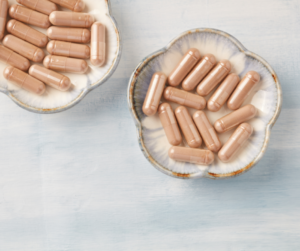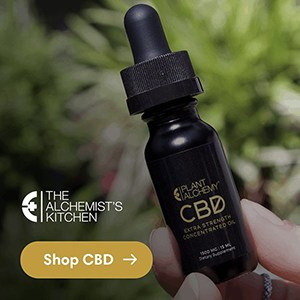With the gut being our “second brain,”– nourishing its diverse population becomes essential to every aspect of our health. Though, as we enter the holiday season, the drool-worthy dishes may be hard to resist. Turkey tail mushroom, medicinal fungi used in traditional medicine for millennia, may be the support needed to balance our gut during the busiest time of the year.
What Is Turkey Tail Mushroom
Turkey Tail or Trametes Versicolor is a disc-like shaped fungus that fruits in various colors and shades. Since the 15th century, many cultures have revered this polypore mushroom for its immune-boosting, anti-inflammatory, and antioxidant components. Known as “kawaritake” or “cloud mushroom” in Japan, turkey tail has a long-dated history where it’s used in Japanese Folk Herbalism to promote cellular growth. Otherwise known as “Yun Zhi” in Chinese, it’s been used in Traditional Chinese Medicine (TCM) for centuries to support lung and liver health, as an immunomodulator, and to help combat infections. However, its lesser-known gut healing effects display profound results on maintaining and improving overall digestive health.
Prebiotics & The Microbiome
You’ve probably heard the saying– “you are what you eat.” This phrase becomes quite literal when looking at the gut microbiome and its relation to the brain. The enteric nervous system depends on similar neurons and neurotransmitters found in the central nervous system, leaving some medical experts to claim our gut as our “second brain.” Our gut communicates with our brain, playing a vital role in many diseases and our overall mental and digestive health.
The gut microbiome is one of the most densely populated microbial communities on the planet. It contains highly diverse, beneficial bacteria that provide several functions that play a crucial role in human health. Several factors influence our gut flora, yet increasingly, diet is a critical environmental factor that balances the composition and metabolic function of the gut. Consuming vital dietary ingredients, such as prebiotics, becomes a necessary component to promoting healthy bacteria.
Prebiotics are selectively fermented ingredients that promote specific changes in the composition and activity of the gut. Unlike probiotics, which are the beneficial bacteria found in high-fiber foods like kimchi and fermented yogurt, prebiotics feed that bacteria. In other words, you need prebiotics for the probiotics to thrive, which is why turkey tail is so beneficial for the gut because of its generous contribution of prebiotics and influence on maintaining overall digestive health from the colon to the entire gastrointestinal tract.
Diversifying The Gut
Studies have shown that Turkey Tail heals the gut by improving the diversity of gut flora by providing prebiotic support. In fact, in a 2014 study, 24 people consumed 2600mg of Polysaccharopeptide (PSP), one of the active compounds found in turkey tail mushrooms. They experienced beneficial changes in gut bacteria with suppressed growth of dangerous E. coli and bacteria strains. Another study showed similar results, finding the turkey tail extract modified the composition of gut bacteria by elevating Bifidobacterium and Lactobacillus, two highly beneficial bacteria, while reducing harmful gut bacteria.
Further, recent studies have shown that regular consumption of prebiotics could help reduce bloating and gas. When taking prebiotics regularly, the microbiota adapts and shifts to a low gas-producing pathway. The use of prebiotics results in less gas because a higher proportion of gas becomes metabolized. With this, turkey tail may be an ideal mushroom to have on hand during mealtime.

The Gift of Gut Health
Whether it be through powder, extract, or tea, there are several ways to consume turkey tail, making de-bloating during the holidays becomes a whole lot easier. Generally, the mushroom extract is from either alcohol, water, or both, then freeze-dried to a powder form. This highly recommended process is called dual extraction and is vital in receiving the full benefits of the fungi. You can use this versatile powder in smoothies, lattes, baked goods, and more, making it an ideal addition to any holiday recipe.
Most used during functional fungi research in clinical trials, turkey tail extracts are easy to administer on the go and remain potent for long-term use. However, the polysaccharides, which are the active prebiotic components of mushrooms, are best extracted in water. After a big meal, you can prepare a mushroom tea or mix the mushroom powder with hot water as a hydrating and soothing way to receive the gut-boosting power of this multifaceted mushroom.
Keeping wellness in mind this holiday season, you can add turkey tail to your shopping list, supporting gut health for the whole family. Our curated list of mushroom products will cover everyone’s needs this winter, as giving the gift of mushrooms is much more than just a gift– it’s sharing the wonders of these medicinal fungi and opens a door into the world of nature’s healing compounds. So whether your loved one is unveiling the traditional uses of a turkey tail through a tincture or improving their fungi routine with mushroom capsules, there’s room to share the joy of mushrooms with everyone this holiday season.
References
“Gut-Brain Connection: What It Is, Behavioral Treatments.” Cleveland Clinic, https://my.clevelandclinic.org/health/treatments/16358-gut-brain-connection.
Hook, Ben. “Study Finds Prebiotics Gas Reduces with Time.” Professionals, Optibac Probiotics, 27 Apr. 2021, https://www.optibacprobiotics.com/professionals/latest-research/gut-health/study-finds-prebiotic-gas-reduces-with-time.
“Nutrition 101: Prebiotics, Probiotics and the Gut Microbiome.” Food Insight, 19 Apr. 2019, https://foodinsight.org/nutrition-101-prebiotics-probiotics-and-the-gut-microbiome/.
Sonnenburg, Justin L., and Fredrik Bäckhed. “Diet–Microbiota Interactions as Moderators of Human Metabolism.” Nature News, Nature Publishing Group, 6 July 2016, https://www.nature.com/articles/nature18846.
Wang, Zeneng, et al. “Gut Flora Metabolism of Phosphatidylcholine Promotes Cardiovascular Disease.” Nature News, Nature Publishing Group, 6 Apr. 2011, https://www.nature.com/articles/nature09922.










